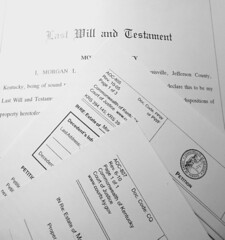We will die, our debts will not. Many people falsely believe that any debts they have incurred will dissolve when they die. Unfortunately, this is not the case. A new article discusses steps you can take to ensure that your debts do not eat away at the assets you had intended would go to your heirs.

One important move you can take now to protect your heirs later is to do what you can to pay down your debt. Speak with a financial advisor about how much debt you have, and how you can responsibly continue to pay it down while you are still alive. If you have a large amount of debt, consider cutting your spending now so you have more money to put towards your debts.
You may also want to consider loan protection insurance. This type of insurance is offered in a declining-term policy that will pay off specific loans if you die or become otherwise unable to pay through disability. Whether you need insurance for your home loan, credit card balances, or car loan, loan protection insurance may be a good option for you. These types of loans are often offered from lenders who provide mortgages, and may be a sensible solution for some individuals and couples.















